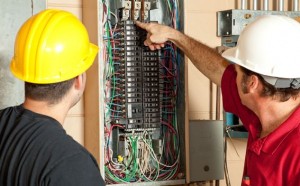There are a definite set number of steps you need to take to become a licensed electrician. An electrician is required to be able to install and maintain electrical systems, diagnose problems and know how to fix them, and run his/her own business successfully. An electrician needs to understand the laws and codes that dictate how he/she is to operate within their State, and they need to be able to conduct their services in such a manner that it is safe for both them and their client. Furthermore, an electrician needs to be in fairly good physical shape, and they must know how to operate a variety of testing devices and power tools.
 To ensure that all licensed electricians meet these same high standards, it is necessary in the United States for candidates who are planning on going into the field to follow the correct steps (in the correct order) to obtain said licenses. It is a strict process, but in ensures that electricians are governed and can be held responsible for their actions.
To ensure that all licensed electricians meet these same high standards, it is necessary in the United States for candidates who are planning on going into the field to follow the correct steps (in the correct order) to obtain said licenses. It is a strict process, but in ensures that electricians are governed and can be held responsible for their actions.
But how long does it take to get a license, and how do you go about it? Here is a quick overview to help you out.
How Long Does It Take To Be A Licensed Electrician?
In total, it should take about five years (less if all goes well) from starting your apprenticeship to getting your license.
After obtaining a high school diploma or General Equivalent, you will be required to take an algebra and comprehension test so as to be entered into an apprenticeship. Apprenticeships take about four years to complete, depending on whether you have decided to specialize or not. General electrician apprenticeships may be shorter than commercial apprenticeships. Your decision to specialize may also affect the rate at which you will be paid while working as an apprentice.
While completing your apprenticeship, it is highly recommended that you enroll in a study course that will suit your field. There are a great number of colleges out there, and even some online ones, so you are sure to find one that suits you. Some colleges offer both a course and an apprenticeship at the same time, so be sure to do your research before making your final decision.
How To Get An Electrical License
After completing both your studies and your apprenticeship, you need to apply at your local licensing department to be able to take the licensing test. The exam will test your knowledge of the State’s codes and regulations, which are necessary for you to know in order to keep your license from being revoked.
The exams differ from State to State, so make sure you know the requirements for yours. Some will allow you to take your handbook into the exam, for example. Also make sure that you know what you are to expect in regards to format (will you be writing an essay, doing a monkey puzzle etc.), as this will help you to prepare accordingly.
You will need to study quite hard for this, and make sure you take in the information properly. Once you have your own business, or you are working for a professional company, you will have to adhere to these codes to keep your license.
Should you pass your exam, you will finally be awarded with a license with which you can do business. You can collect it from your local licensing department.
How To Get A Contractors License
If you should decide to open your own contracting business, you will need to obtain an electrical contractors license. Each State has different regulations when it comes to this, but in general you will need the following:
-
You will need to prove that you have a high school diploma or General Equivalent.
-
You will need to prove that you are a citizen of the United States of America.
-
You will need to prove that you have a qualification for the area you aim to work in.
-
You will need to prove that you have done practical training in the field.
-
You will need to prove that you have a license to work in the specified field.
-
You will also have to hand in bank statements to prove that you have the means to get your business off the ground.
However, some States may require more, and others less. You will need to find out the specific requirements from your local authorities. Some States may even require you to write another test or major exam.
These steps are necessary however, for you to be able to start and grow your business.
Gaining an electrician license requires you to work hard in a physically and mentally draining environment. It takes a good deal of dedication. However, the work is highly rewarding and will leave you with a skill set that is sure to withstand the test of time.

 If you are thinking of starting a career as an electrician
If you are thinking of starting a career as an electrician What’s more, the different types of electricians each have their own unique set of responsibilities. They are divided into three main groups: journeyman, apprentice, and commercial electrician. However, before we look at each of these, we need to understand the basics of what the average electrician does.
What’s more, the different types of electricians each have their own unique set of responsibilities. They are divided into three main groups: journeyman, apprentice, and commercial electrician. However, before we look at each of these, we need to understand the basics of what the average electrician does.